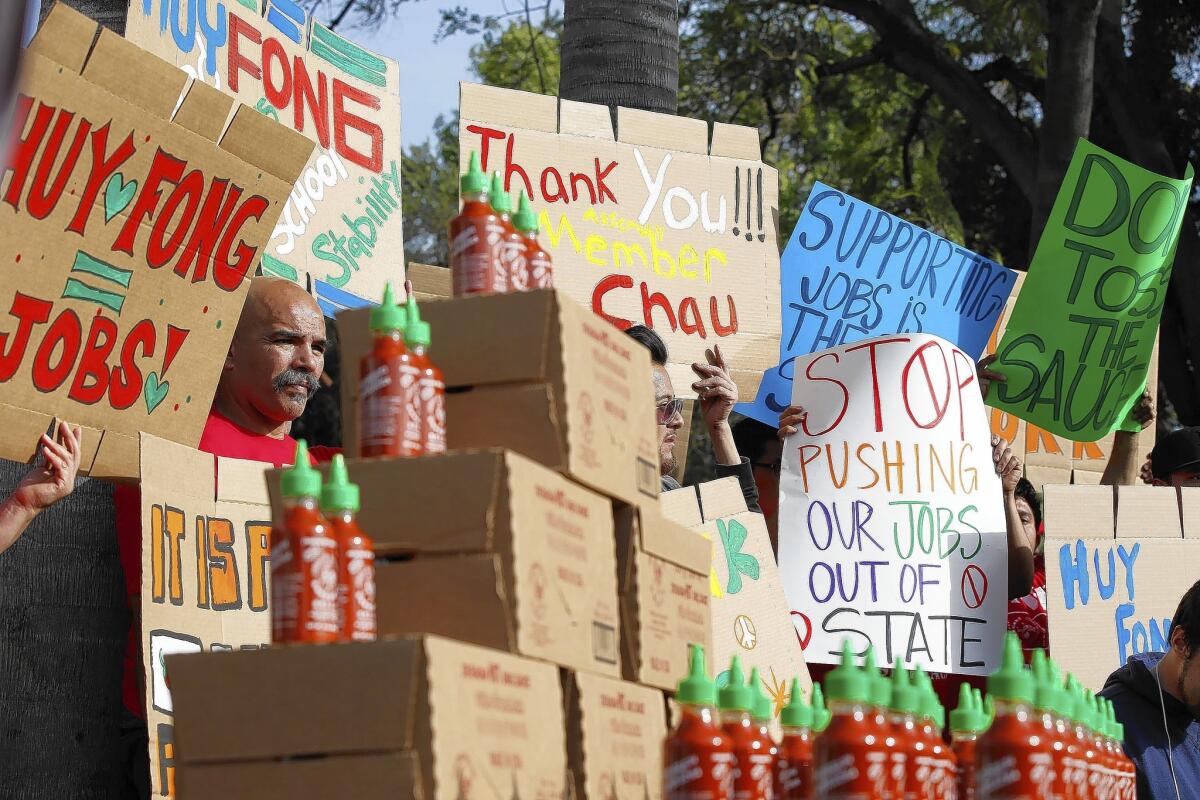Sriracha sauce becomes a hot political issue with bipartisan backing

California’s latest political darling comes in a clear plastic bottle with a green top and tastes good on eggs.
Sriracha hot sauce has won the eager endorsement of politicians from both sides of the aisle in recent weeks as the manufacturer has talked about leaving Irwindale amid a regulatory battle over whether the plant sends a spicy smell into nearby neighborhoods.
Council members, state senators, a mayor or two and even members of Congress have weighed in in support of Sriracha in an unlikely piece of political theater over jobs and government interference.
Relocating the Sriracha factory, which relies on long relationships with local suppliers, would be expensive and time-consuming, and it’s unclear how seriously Chief Executive David Tran is considering a move.
But Tran has invited potential suitors to tour the factory in Irwindale. The idea of poaching the hot sauce has inflamed politicians’ imaginations across the country, especially in Texas, where officials are crowing over the news that Toyota will move its Torrance headquarters — and thousands of jobs — to Plano, outside Dallas. Later this month, Texas state Rep. Jason Villalba, a Republican, will lead a delegation from Texas to visit the Sriracha plant and make their case.
“#Sriracha may not be welcome in California, but you’d be welcomed with open arms and eager taste buds in Texas,” Rep. Ted Cruz (R-Texas) tweeted last week.
Residents of the tiny industrial city of Irwindale say the Sriracha hot sauce factory emits odors that cause asthma, coughing, choking and other health problems. City officials have sued and won a preliminary, partial injunction. The City Council is considering further action.
City officials don’t buy the idea of Sriracha as a political symbol of excessive government regulation. To them, it’s a public health issue.
“There are children and people that suffer from asthma, and when the smell is strong in certain parts of town, you can’t go outside,” City Atty. Fred Galante said. “If the residents are experiencing these kinds of effects, does their voice not matter?”
But outside Irwindale, the sauce maker is quickly building allies.
The Los Angeles County GOP, Rep. Tony Cardenas (D-Los Angeles) and state Sen. Ed Hernandez (D-West Covina) are some of the latest to jump on the Sriracha bandwagon. Hernandez called the sauce maker one of the “shining stars” of the San Gabriel Valley’s business community. Cardenas toured the plant last week and spoke with company representatives about tax incentives to keep the business in the state.
Republican gubernatorial candidate Neel Kashkari namechecked Sriracha on a recent tour of a charter school in Los Angeles.
“It is a greater symbol of the broader poor business climate, or hostile business climate, that we have in California. And it’s something the people can rally around,” Kashkari told reporters.
On Kashkari’s campaign website, a page thanks visitors for “standing with Sriracha.” Beneath the Facebook and Twitter share links, a button urges hot sauce fans: “Chip in $7.”
Tran’s narrative is irresistibly populist. An immigrant and refugee who followed an American dream from Vietnam to a small business in Chinatown, Tran has created an international sauce empire that rakes in more than $60 million in annual revenue. Then he ran into trouble with government regulation — namely, public nuisance laws in Irwindale.
Tran’s story has lent itself to Republican talking points about government overreach and lets local politicians take pro-jobs stances. Some of Tran’s comments have fed that narrative.
“I have had the bad luck to move into a city with a government that acts like a local king,” Tran said last week in an interview.
Voter records show that Tran was registered as a Republican in 1998, 2000, and 2002, but he said Friday that neither he nor his company had ever had any political affiliation. He added that he couldn’t recall the last time he voted because it was so long ago.
“All parties should have the same goal … keep jobs here locally and in the United States,” Tran said in a statement to The Times.
Jack Pitney, a political science professor at Claremont McKenna College, says it’s easy to see why Sriracha is becoming a political issue.
“The speech writes itself,” he said. “Though I don’t know if any of the politicians siding with the hot sauce are looking to buy property next door,” he added.
The city, meanwhile, says they’ve received more than enough complaints to justify their actions against the company, and an environmental consultant hired by the city corroborated residents’ concerns.
But inspectors from the South Coast Air Quality Management District have tested the factory multiple times and found no evidence of a violation. The agency said just four households have made about two-thirds of the approximately 70 complaints they’ve received.
Last week the City Council gave Sriracha’s maker, Huy Fong Foods, a brief reprieve and delayed the adoption of a resolution that would have declared the factory a public nuisance for about two weeks. But Galante said Sriracha’s sudden political capital has nothing to do with it.
“It just doesn’t seem like it’s worth addressing,” Galante said. “I don’t think it’s reasonable that a few-thousand-dollar air filtration fix is really going to drive out a company that’s spent more than $30 million to build a factory. I don’t understand that logic.”
Times staff writer Seema Mehta contributed to this report.
More to Read
Sign up for Essential California
The most important California stories and recommendations in your inbox every morning.
You may occasionally receive promotional content from the Los Angeles Times.











